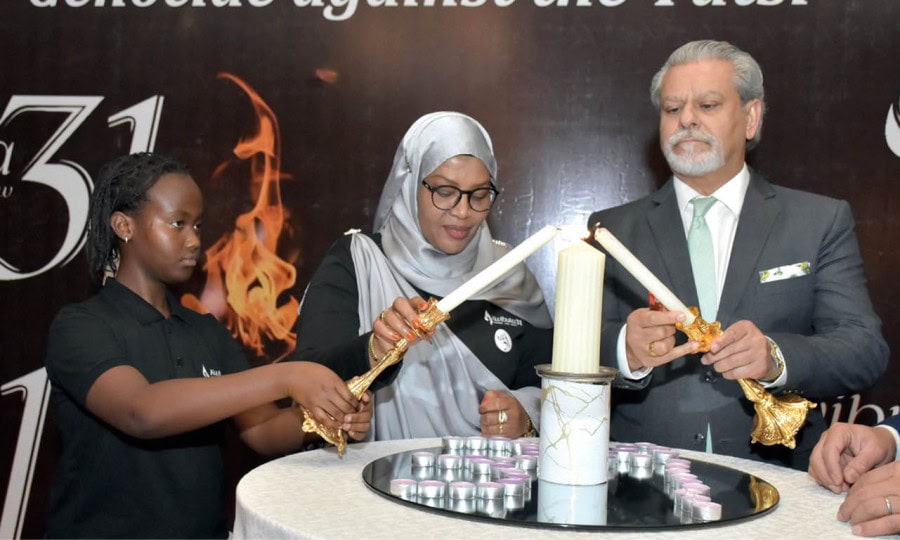Honouring the memory of more than 1 million Rwandans who died in just one hundred days of the Genocide against the Tutsi in 1994, the High Commission of the Republic of Rwanda hosted a solemn commemoration, ‘Kwibuka’ or ‘To Remember’, at the Serena Hotel.
Kwibuka is an annual commemoration period that starts on April 7 and lasts for 100 days.
It serves as a solemn remembrance of the 1994 genocide against the Tutsi, a dark period in Rwandan history.
Being the 31st years of genocide, this year’s ‘Kwibuka 31’ saw the presence of many diplomats, government officials, members of the Rwandan community and friends of Rwanda.
The Additional Secretary (Africa), Ministry of Foreign Affairs, Hamid Asghar Khan, was the Chief Guest on the occasion. The audience was also addressed by the UN Resident Coordinator, Mohamed Yahya, a survivor of the genocide, Claver Irakoze, the High Commissioner of Rwanda, and the host, Ms Harerimana Fatou.
They also lit candles in memory of the victims.
In his remarks, Chief Guest Hamid Asghar Khan lamented the tremendous loss of lives of those who were massacred mercilessly.
He said he had visited the memorial site at Kigali and was left aghast to see how many the militias slaughtered innocent children, women and men in the name of ethnic differences.
“The visit proved a powerful and moving experience,” he said.
Today, not only are the Rwandans remembering the victims of genocide, but memorials are also taking place all over the world.
He acknowledged that ‘Kwibuka’ was taking place in Pakistan for the first time after the opening of embassies in both countries.
Ambassador Hamid emphasized that peace had returned to Rwanda and that the country was on the path to progress and prosperity; however, the world was not free of conflicts.
Today, what is taking place in Gaza is a bitter reminder of the fact that genocidal violence continues and that sections of mankind have not learned any lessons.
The Palestinian children, women, elderly people, and even the rescue workers and medics are being killed by the Israeli forces, but the world, including the UN, is a helpless spectator, he regretted.
He called upon the world powers to unite for peace and curb aggression worldwide.
UN Coordinator Mohamed Yahya also shared the pain and grief of the Rwandans all over the world and assured the UN would continue to work against hate speech.
In her speech, Ms Harerimana Fatou expressed her gratitude to all the guests and reflected on the tragic history of the 1994 genocide against the Tutsi, which took over 1 million lives.
She emphasized the importance of remembrance and unity, highlighting Rwanda’s remarkable journey of recovery and reconciliation over the past 31 years.
She also paid tribute to the survivors, noting that we should never forget to thank President Paul Kagame & the Patriotic Army of Rwanda for their courageous decision to put an end to the genocide against the Tutsi.
She called on the international community to take a firm stand against hate speech and genocide ideology, stressing that the world must move beyond being just observers and instead take action to prevent such atrocities from recurring.
This event also featured survivor testimonies.
Claver Irakoze, who is a survivor and also an author, shared with the audience the trauma he suffered as a teen boy.
Both his parents were teachers.
When genocide started in April 1994, his family (they were five children) took refuge in a church in the capital city of Rwanda, Kigali.
“We stayed there till June 2 when RPF liberated us, but between April and June, soldiers came and took refugees from that Catholic church, and my father was among the very first men who were taken away to be killed.”










